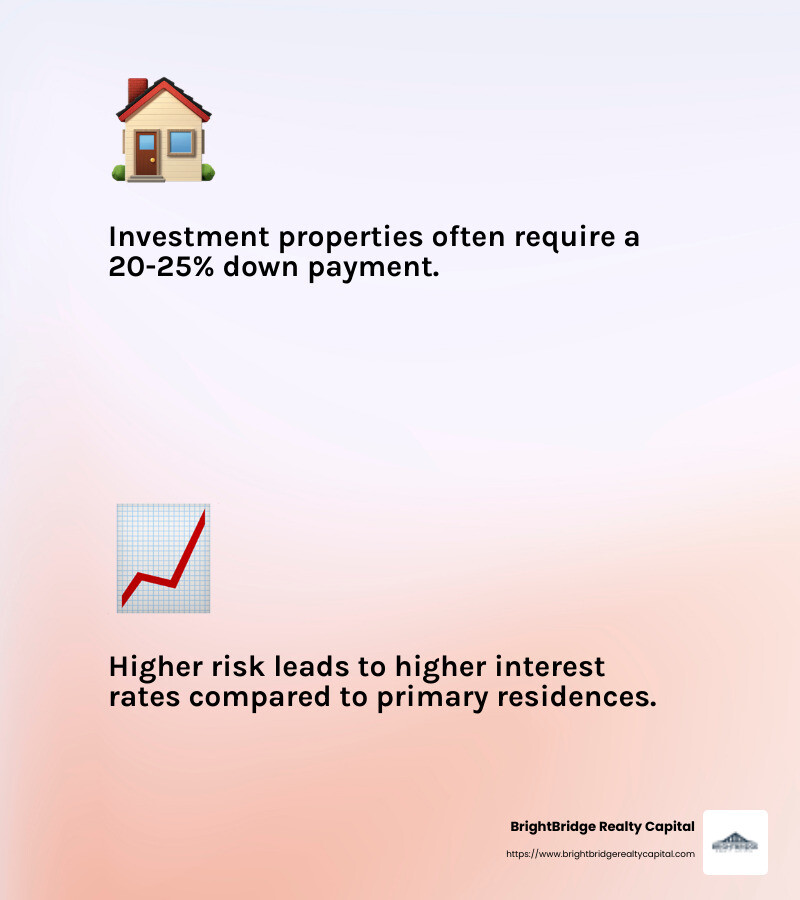Rate Race: Finding the Best Real Estate Investment Loan Rates

Investment real estate loan rates are a critical consideration for anyone looking to expand their real estate portfolio or break into the property investment market. These rates are typically higher than those for primary residences due to the perceived risk associated with investment properties. If you're considering this route, here are some key points to keep in mind:
Rates are often 0.5% to 1% higher than typical mortgage rates for a primary home.
Lenders see investment properties as riskier, hence the higher rates.
Credit scores and down payments greatly influence these rates; a score of 740+ usually fetches the best deal.
Shop around: Compare offers from multiple lenders to find competitive rates.
In the busy world of real estate, finding the best loan rates is pivotal for maximizing returns. It requires understanding risk factors, creditworthiness, and the loan landscape. The difference in interest rates can significantly impact your overall investment profitability over time. Whether it's for a sleek new rental or a promising fix-and-flip, getting the right loan at the right rate is essential.
Investors face the challenge of navigating varying rates and terms while ensuring their projects remain financially viable. It's about aligning financial goals with the best available financing options, often requiring strategic moves and thorough market research.
Explore more to ensure your investment journey is profitable and sustainable.

Investment real estate loan rates terms to remember:
- current investment property mortgage rates
- conventional mortgage rates investment property
- interest rate for investment property today
Understanding Investment Real Estate Loan Rates
Navigating investment real estate loan rates can feel like a daunting task, but understanding the factors that influence these rates can make it much easier. Let's break down the essentials.
Factors Influencing Rates
Investment property loans come with higher interest rates compared to primary residence loans. But why? Here are some key factors:
Property Type: Multi-unit buildings or commercial properties often come with higher rates due to increased risk. Single-family homes might offer slightly better rates.
Location: Mortgage rates can vary by state and even by city. Some areas have higher average rates due to local economic conditions or demand.
Down Payment: A larger down payment can lower your rate. Lenders typically require at least 20-25% for investment properties. The more you put down, the less risky the loan appears to lenders.
Risk Factors: Lenders view investment properties as riskier than primary homes. This is because if financial troubles arise, borrowers are more likely to prioritize payments on their primary residence over an investment property.

Comparing Investment vs. Primary Residence Rates
When comparing investment real estate loan rates to those for primary residences, you'll notice a distinct difference:
Higher Rates: As mentioned, investment property loans are typically 0.5% to 1% higher. This is due to the risk assessment by lenders.
Risk Assessment: Lenders assess the borrower's ability to manage the mortgage without relying solely on rental income. This often leads to stricter qualification criteria.
Understanding these factors helps investors make informed decisions. By knowing what influences rates, you can better prepare your financial profile to secure the best possible terms. Always remember to shop around and negotiate to find the best rate for your investment goals.
How to Secure the Best Investment Real Estate Loan Rates
Securing the best investment real estate loan rates involves several strategic steps. Let's explore how you can improve your financial profile and negotiate effectively with lenders.
Improving Your Financial Profile
Boost Your Credit Score
Your credit score is a key factor in determining your loan rate. A higher score can lead to lower interest rates, which means less money paid over the life of the loan. Aim for a score of 740 or above to get the best rates.
- Tip: Check your credit report for errors and correct them. Pay down outstanding debts and avoid new credit inquiries before applying for a loan.
Manage Your Debt-to-Income Ratio
Lenders look at your debt-to-income (DTI) ratio to assess your ability to handle monthly payments. A lower DTI ratio indicates better financial health.
- Action Plan: Pay off existing debts where possible. This not only improves your DTI ratio but also positively impacts your credit score.
Save for a Larger Down Payment
A larger down payment reduces the lender's risk, which can result in better loan terms. Aim for at least 20-25% down on investment properties.
- Why It Matters: A bigger down payment can lead to lower interest rates and avoid private mortgage insurance (PMI), saving you money in the long run.
Negotiating with Lenders
Shop Around for the Best Rates
Don't settle for the first offer. Compare quotes from multiple lenders, including banks, credit unions, and online lenders. Each will have different terms and rates.
- Pro Tip: Use these quotes to negotiate better terms. Let lenders know you're shopping around; they may offer better rates to win your business.
Ask for Flexible Terms
Lenders might offer more favorable terms if you negotiate. This could include lower rates, reduced fees, or flexible payment options.
- Negotiation Strategy: Be clear about your needs and financial situation. Use your good credit score and strong financial profile as leverage.
Consider a Mortgage Broker
If negotiating isn't your strong suit, consider hiring a mortgage broker. They can help you steer the options and find the best deal.
- Benefit: Brokers have access to a wide range of lenders and can often secure better rates than you might find on your own.
By improving your financial profile and effectively negotiating with lenders, you can secure the best investment real estate loan rates. This sets a solid foundation for your investment journey, maximizing your returns and minimizing costs.
Types of Investment Property Loans
When financing an investment property, choosing the right type of loan is crucial. Each loan type has unique features, benefits, and requirements. Let's explore the main types: conventional loans, government-backed loans, and alternative financing options.
Conventional Loans
Conventional loans are the most common choice for investment properties. These loans are not insured by the government and typically come with stricter requirements compared to loans for primary residences.
Down Payment: Expect to put down at least 15-25%. A larger down payment can reduce your interest rate and eliminate the need for private mortgage insurance (PMI).
Interest Rates: These loans usually have higher interest rates than those for primary residences due to the increased risk for lenders. Rates are often about 0.5% to 1% higher.
Conventional loans are ideal if you have a strong credit score and can afford a significant down payment. They offer flexibility in terms of property type and loan amount.
Government-Backed Loans
Government-backed loans provide an alternative for those who might not meet the stringent criteria of conventional loans. However, these are typically not available for investment properties.
FHA Loans: Designed for primary residences, FHA loans require a lower down payment and credit score. They are not suitable for investment properties unless you plan to live in the property and rent out part of it.
VA and USDA Loans: Similar to FHA loans, these are intended for primary residences. VA loans are for veterans, while USDA loans target rural areas.
While these loans offer attractive terms for primary residences, they are generally not an option for investment properties unless you plan to occupy part of the property yourself.
Alternative Financing Options
For investors seeking flexibility, alternative financing options like portfolio loans and hard-money loans may be the answer.
Portfolio Loans: These loans are retained by the lender and not sold on the secondary market. This allows for more flexible terms and conditions. They can be ideal for investors with unique financial situations or those looking to finance multiple properties.
Hard-Money Loans: These are short-term loans provided by private lenders. They are based on the property's value rather than the borrower's creditworthiness. While they come with higher interest rates, they offer quick approval and flexible terms.
Alternative financing options can be beneficial for investors who need more flexibility or have non-traditional financial profiles.
By understanding the different types of loans available, you can choose the best fit for your investment strategy and secure the most favorable investment real estate loan rates.
Frequently Asked Questions about Investment Real Estate Loan Rates
Are mortgage rates higher for investment properties?
Yes, mortgage rates are typically higher for investment properties compared to primary residences. This is because investment properties pose a greater risk to lenders. Unlike a primary home, which you are more likely to prioritize paying, an investment property may become less of a priority if financial hardships arise. To mitigate this risk, lenders charge higher interest rates, usually about 0.5% to 1% more than those for owner-occupied properties.

What is the minimum down payment for an investment property?
The minimum down payment for an investment property generally starts at 15% for a single-unit property. However, putting down at least 20% is advisable to avoid private mortgage insurance (PMI) and secure better loan terms. For 2-4 unit properties, expect to pay at least 25% down. Higher down payments reduce the loan-to-value ratio, which can help in negotiating lower interest rates.
Can you use a government-backed loan for investment properties?
Government-backed loans, such as FHA, VA, and USDA loans, are primarily designed for primary residences and come with specific occupancy requirements.
FHA Loans: These require you to live in the property as your primary residence. However, you can purchase a multi-unit property (up to 4 units) with an FHA loan, live in one unit, and rent out the others. This allows you to leverage a lower down payment of 3.5% while still earning rental income.
VA Loans: Available for veterans, these loans also require the borrower to occupy the property. Similar to FHA loans, you can purchase a multi-unit property, live in one unit, and rent the others. VA loans offer the advantage of zero down payment.
USDA Loans: These are intended for rural properties and require you to live in the home. They are not typically used for investment properties unless you plan to reside in part of it.
In summary, while government-backed loans offer favorable terms for primary residences, they are generally not suitable for pure investment properties unless you plan to occupy part of the property yourself.
Conclusion
Navigating investment real estate loan rates can be complex, but with the right partner, it becomes much simpler. At BrightBridge Realty Capital, we specialize in offering competitive rates and a seamless lending process for real estate investors across the nation.
Our unique approach sets us apart. We provide direct lending, eliminating intermediaries to ensure you get some of the best rates available. This means faster approvals and closings, often within a week, allowing you to seize investment opportunities as they arise.
Our team understands that every investor's strategy is unique. Whether you're flipping properties, building new homes, or expanding a rental portfolio, we tailor our loan solutions to meet your specific needs. This flexibility ensures that you have the financial support needed to keep your projects on track.
For those looking to explore their options, we invite you to learn more about our services. Find how our fast, flexible funding solutions can help you achieve your investment goals today.
Explore Investment Property Loans with BrightBridge Realty Capital
In conclusion, securing the best investment real estate loan rates is about more than just numbers. It's about finding a partner who understands your vision and provides the tools to make it a reality. At BrightBridge Realty Capital, we're here to support your journey every step of the way.


